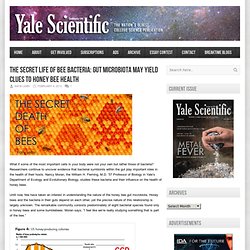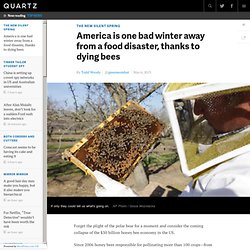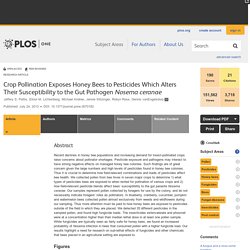

Rombaut Verdonck
Apiculture. ASH/FDA Workshop in Clinical Endpoints in Multiple Myeloma - ReportHoneyBeeHealth.pdf. The world's longest established apicultural research publishers - International Bee Research Association. Honeybee: Bayer - Wageningen University - BBKA. Scientists discover what’s killing the bees and it’s worse than you thought. Universal Basic Income (UBI) proposals are gaining in popularity across the political spectrum.

The measures would see governments hand a set monthly income to every single citizen within a country, either in addition to existing benefits or in place of them (depending on the details of the particular UBI proposal). Left-wing fans favor UBI’s ability to eradicate absolute poverty, while right-wing libertarians are drawn to its simplicity and reduction in bureaucracy. In Silicon Valley, startup investment firm Y Combinator has plans to fund a basic income experiment in the US, while Finland announced last year it would conduct its own extensive experiment. The Nation's Oldest College Science Publication – The Secret Life of Bee Bacteria: Gut Microbiota May Yield Clues to Honey Bee Health. What if some of the most important cells in your body were not your own but rather those of bacteria?

Researchers continue to uncover evidence that bacterial symbionts within the gut play important roles in the health of their hosts. Nancy Moran, the William H. Fleming, M.D. ’57 Professor of Biology in Yale’s Department of Ecology and Evolutionary Biology, studies these bacteria and their influence on the health of honey bees. Until now, few have taken an interest in understanding the nature of the honey bee gut microbiota. Honey bees and the bacteria in their guts depend on each other, yet the precise nature of this relationship is largely unknown.
Europe Bans Pesticides Thought Harmful to Bees. America is one bad winter away from a food disaster, thanks to dying bees. Forget the plight of the polar bear for a moment and consider the coming collapse of the $30 billion honey bee economy in the US.

Since 2006 honey bees responsible for pollinating more than 100 crops—from apples to zucchini—have been dying by the tens of millions. As a new report from the US Department of Agriculture (USDA) details, scientists are still struggling to pinpoint the cause of so-called Colony Collapse Disorder (CCD) and time is running out. “Currently, the survivorship of honey bee colonies is too low for us to be confident in our ability to meet the pollination demands of U.S. agricultural crops,” the report states.
Some signs of beemageddon: CCD has wiped out some 10 million bee hives worth $2 billion over the past six years. The death rate for colonies has hit 30% annually in recent years and there are now about 2.5 million honey bee colonies in the US, down from 6 million in 1947 and 3 million in 1990. If that sounds scary, it is. Honey Bees and Colony Collapse Disorder. Honey bees, which are a critical link in U.S. agriculture, have been under serious pressure from a mystery problem: Colony Collapse Disorder (CCD), which is syndrome defined as a dead colony with no adult bees or dead bee bodies but with a live queen and usually honey and immature bees still present.

No scientific cause for CCD has been proven. But CCD is far from the only risk to the health of honey bees and the economic stability of commercial beekeeping and pollination operations in the United States. Since the 1980s, honey bees and beekeepers have had to deal with a host of new pathogens from deformed wing virus to nosema fungi, new parasites such as Varroa mites, pests like small hive beetles, nutrition problems from lack of diversity or availability in pollen and nectar sources, and possible sublethal effects of pesticides. Contents. ReportHoneyBeeHealth. Declining Bee Populations Pose A Threat to Global Agriculture by Elizabeth Grossman.
30 Apr 2013: Report by elizabeth grossman One of every three bites of food eaten worldwide depends on pollinators, especially bees, for a successful harvest.

And in the past several months, a scramble in California’s almond groves has given the world a taste of what may lie in store for food production if the widespread — and still puzzling — decimation of bee colonies continues. For much of the past 10 years, beekeepers, primarily in the United States and Europe, have been reporting annual hive losses of 30 percent or higher, substantially more than is considered normal or sustainable. But this winter, many U.S. beekeepers experienced losses of 40 to 50 percent or more, just as commercial bee operations prepared to transport their hives for the country’s largest pollinator event: the fertilizing of California’s almond trees.
‘In the long run, if we don't find some answers, we could lose a lot of bees,’ says one expert. Crop Pollination Exposes Honey Bees to Pesticides Which Alters Their Susceptibility to the Gut Pathogen Nosema ceranae. Abstract Recent declines in honey bee populations and increasing demand for insect-pollinated crops raise concerns about pollinator shortages.

Pesticide exposure and pathogens may interact to have strong negative effects on managed honey bee colonies. Such findings are of great concern given the large numbers and high levels of pesticides found in honey bee colonies. Thus it is crucial to determine how field-relevant combinations and loads of pesticides affect bee health. We collected pollen from bee hives in seven major crops to determine 1) what types of pesticides bees are exposed to when rented for pollination of various crops and 2) how field-relevant pesticide blends affect bees’ susceptibility to the gut parasite Nosema ceranae.
Citation:Pettis JS, Lichtenberg EM, Andree M, Stitzinger J, Rose R, et al. (2013) Crop Pollination Exposes Honey Bees to Pesticides Which Alters Their Susceptibility to the Gut Pathogen Nosema ceranae. Editor: Fabio S. Introduction Methods Ethics Statement.
Pearltrees tips. Nikola Tesla.